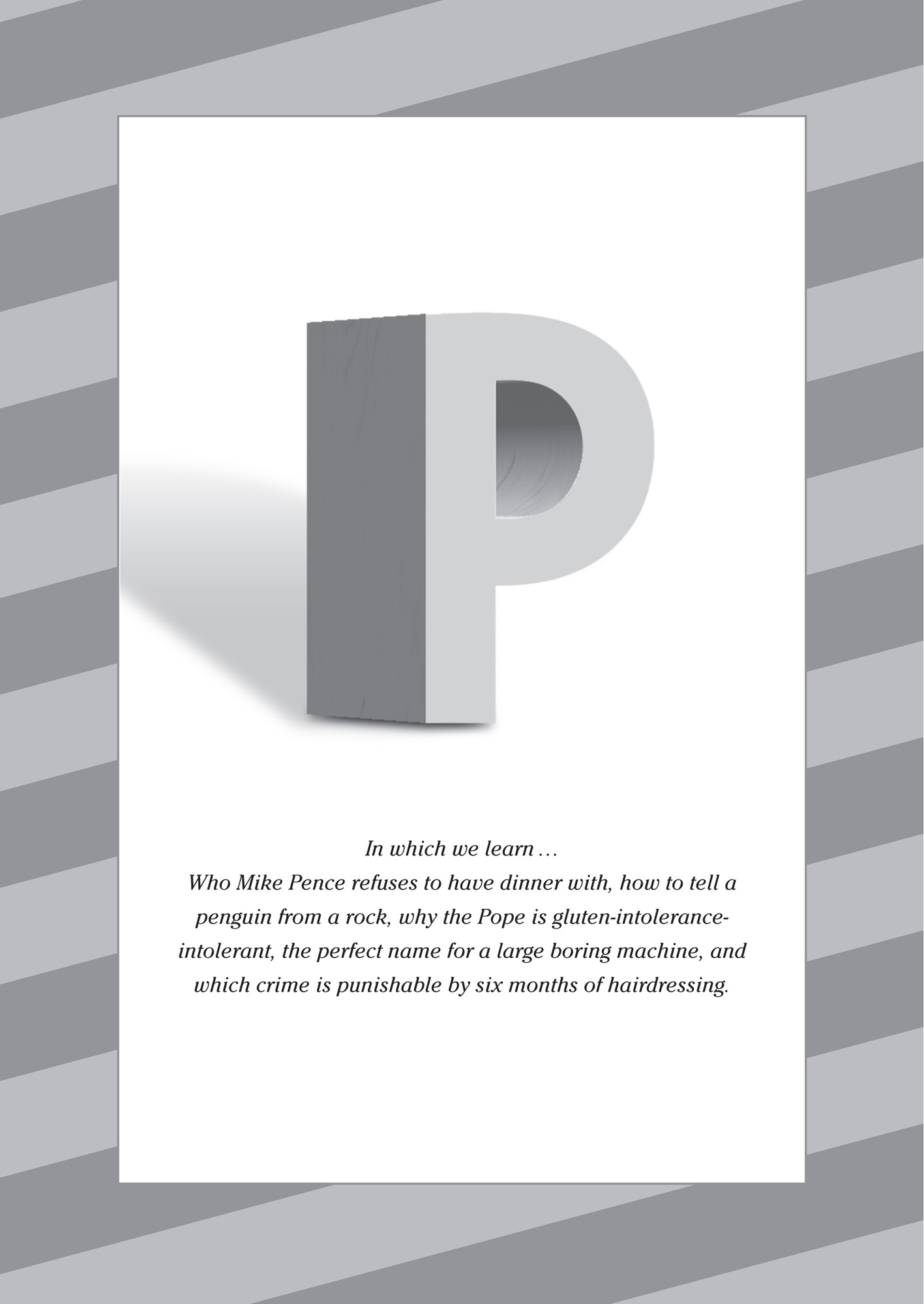

PAINTINGS▶
Michael Jackson’s chimpanzee Bubbles sold five paintings. The gallery owner described them as ‘abstract’.

Bubbles’s pictures featured in an exhibition called ‘Apes That Paint’, in which artworks created by chimpanzees and orangutans were displayed. He made $3,750 altogether from the sales, which will be donated to the Center for Great Apes, in Florida, where he lives. All the artists whose work was on show are retired, after careers in entertainment or medical research, and live at the Center. Other famous apes there include Jonah, who starred in the 2001 remake of Planet of the Apes, and BamBam, who played a character called Nurse Precious in the soap opera Passions. Bubbles took up painting after Jackson’s death, and according to the Center he also enjoys listening to flute music, but his favourite activity is ‘playing in tubs of water’.
Elsewhere in art news:
▶ The world learned of a painting that’s been hidden in the Antarctic for 118 years. It’s a watercolour of a dead bird painted by one of Captain Scott’s companions, Dr Edward Wilson, who died along with Scott in 1912. It was found in a pile of papers in one of their huts, covered in mould and penguin excrement.
▶ The oldest known Australian oil paintings were found at London’s Royal College of Surgeons. The paintings, produced between 1800 and 1807, are – predictably – of kangaroos.
▶ In Georgia, a painting longer than a football pitch moved to a new home. The 374-foot-long, 40-foot-high structure was successfully relocated from the Atlanta Cyclorama & Civil War Museum (to make way for a zoo) to the Atlanta History Center, 12 miles away. Two huge holes were cut into the roof of the 100-year-old Cyclorama building, and the 131-year-old oil painting The Battle of Atlanta was split in two, rolled up and lifted out by a crane. It was transported on the back of a truck to its new home, where it was lowered through the roof, unrolled and reassembled.
▶ A painting by Kandinsky became the most expensive painting by the artist ever to be sold, going for a record £21 million. Twenty-two minutes later, the record was broken again by a different Kandinsky work, which sold for £33 million.
PARLIAMENTS▶
The Houses of Parliament spent £8,900 on killing moths.
The total amount spent on pest control during the course of the last year was around £130,000, including £16,000 to hire a hawk to keep pigeons at bay. More than 1,700 traps were set – not surprising given that there were 411 recorded mouse-sightings (up from 313 the year before).
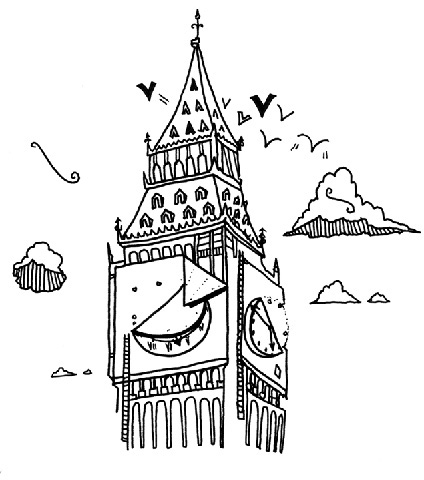
And it’s not just vermin that are a problem. Parliament is in a state of terrible disrepair: it’s draughty, full of asbestos and is prone to flooding (in 2012, MP Ben Bradshaw discovered that urine from the lavatories on the floor above him was leaking through the ceiling and on to his desk). What’s more, the Palace of Westminster is a huge fire risk and had to be made subject to a fire safety order in 2005. This means that it can only continue to be used if fire safety officers, working in shifts, patrol it 24 hours a day.
Perhaps China might be prepared to help. This year the Chinese government announced that it would spend $58 million building a new parliament for the Republic of Congo as a gift. In recent years, China has generously constructed a new parliament for Zimbabwe, refurbished Sierra Leone’s parliament and foreign ministry, renovated Zambia’s government buildings, erected a new presidential palace in Mozambique, donated security facilities to Ghana’s parliament, and given $25 million to help build residences for the Ugandan president and prime minister.
China wasn’t the only country to build a new parliament this year: the Russian defence ministry built a miniature model of Germany’s Reichstag parliament building, so the country’s youth soldiers could practise storming it. It was built in Russia’s ‘Patriot Park’, nicknamed ‘Military Disneyland’, for Russia’s Youth Army – a network of children being taught military skills by the real army. In April, 2,000 people re-enacted the storming of the Reichstag in 1945 – although observers noticed that the replica building appeared to have been modelled on the contemporary Reichstag. A German foreign ministry spokesman reacted with surprise, saying ‘We wouldn’t build something like that for the education of German youth.’
PASSPORTS▶
Brexiteers looked forward to new blue passports, but blue travel documents are already used in the UK: by refugees.
The ‘traditional’ blue design was actually used on British passports for only 68 of the 477 years that they have existed, but it seems certain to return when Britain reveals its post-Brexit design. If that happens, Britain will join the list of blue-passport countries, which currently includes the USA, Australia, El Salvador, Venezuela, Israel, Iraq, Syria and North Korea. It may at least save money, since the main reason they were blue in the first place was that it was an extremely cheap ink to make.
Britain’s passports ceased to be the world’s most powerful this year, losing that position to Germany. Germans can visit 176 countries around the world without needing a visa, while Britons can visit only 173. At the bottom of the table is Afghanistan, whose passport gets holders into just 24 countries without a visa being necessary.
Pakistan features just a couple of places higher than Afghanistan. It’s not usually seen as an LGBTQ friendly country because homosexuality is still illegal there, but this year it did introduce gender-neutral passports, joining India, Germany, New Zealand and Nepal in offering a third sex option.
PENCE, MR AND MRS▶
The US vice president refuses to dine alone with any woman he’s not married to.
While writing a profile of Mike Pence’s wife, Karen, the Washington Post found some comments from an old interview in which Pence had said he refused to eat alone with any woman but Karen. Pence also revealed that he declined to attend events that involved alcohol unless Karen was with him, saying, ‘If there’s alcohol being served and people are being loose, I want to have the best-looking brunette in the room next to me.’ In another profile this year, Rolling Stone revealed that Pence calls his wife ‘Mother’ when they’re dining together.
It turned out that a lot of Americans agree with the Pences’ dining arrangements: a New York Times poll found 53 per cent of women and 45 per cent of men thought it inappropriate for someone to have dinner with someone of the opposite sex unless they were married to them.
The story of the Pences’ engagement is extremely romantic: nine months into their relationship, the two went to feed some ducks at a canal, only for Karen to discover that Mike had hollowed out two loaves of bread, with a small bottle of champagne in one and a ring in the other. She had her answer prepared – for a month she had been carrying around a small gold cross engraved with the word ‘Yes’, just in case Mike proposed. They later had the bread shellacked as a keepsake.
Karen Pence used to run a company that sold ‘towel charms’ – little metal tags that can be attached to towels to tell them apart (as she put it, ‘The goal is to eliminate having to wash towels every day because no one knows which towel is theirs’). But it’s not all just about work. Religion, too, plays a big part in the Pences’ lives: Mike’s colleagues nicknamed him ‘the Choirboy’ and Karen occasionally prays for an ill friend’s haemoglobin count.
PENGUINS▶
A male penguin looked for a mate on Plenty of Fish.
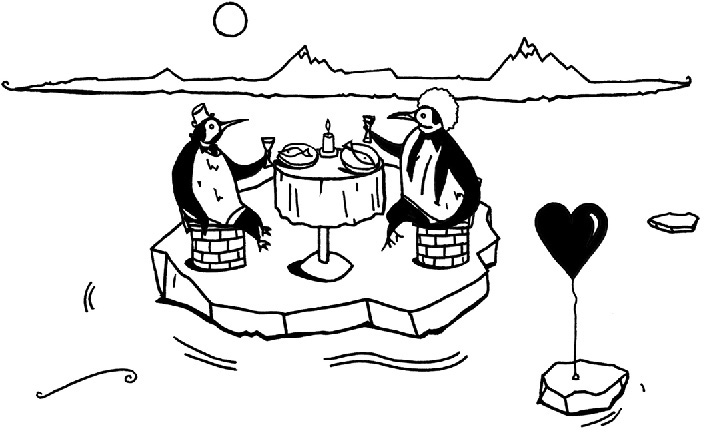
A penguin specialist at a Dorset sea-life centre uploaded a dating (or, more precisely, mating) profile for a Humboldt penguin called Spruce after all the other penguins in his enclosure paired up. His keepers decided that, as he was now a year old, he was ready to join the centre’s breeding programme, and turned to the online dating site when they realised there were no unattached females sharing his enclosure.
Computers and penguins interacted in other ways this year, as scientists set out to teach the former how to identify the latter. They want to employ AI technology to count penguins in the Antarctic, but first the robots need to know how to distinguish penguins from rocks. Members of the public have helped out, labelling penguins in various Antarctic photos in order to teach computers what they look like.
And while computers have been learning from people, people have been learning from penguins. During a cold snap in Berlin, the German Society of Orthopaedics and Trauma Surgery advised that humans should walk like penguins to avoid falling over on ice. Specifically, they recommended that people lean forward as they walk, thus moving their centre of gravity on to their front foot and reducing the risk of slipping.
PEPSI▶
In a survey, 44 per cent of Americans who watched Pepsi’s controversial Kendall Jenner advert said it made them like Pepsi more.
In the advert, Jenner is seen defusing a stand-off between police and protesters by handing an officer a can of Pepsi. Many considered this a cynical exploitation of the social justice movements that swept through America this year. Martin Luther King Jr’s daughter Bernice evidently wasn’t one of the 44 per cent who responded positively to the advert. She sarcastically tweeted: ‘If only Daddy would have known about the power of #Pepsi.’ Pepsi pulled the advert the day after it first ran.
Unfortunately, Pepsi cans demonstrably do not solve problems with the law. A protester in Portland discovered this after his offer of a can was refused by a riot police officer. Later that day, protesters turned violent and started pelting the police with – among other things – Pepsi cans.
The advert wasn’t the only disaster Pepsi has had on the streets this year. Only a few weeks after it was pulled, a Pepsi warehouse in Russia collapsed, releasing 28 million litres of its products and flooding the entire town of Lipetsk.
PHONES▶
Smartphones spread head lice.
Following a dramatic increase in head lice cases over the past few years, a study presented at the British Association of Dermatologists revealed that children are more than twice as likely to be infected if they own a smartphone. It’s assumed this is because kids put their heads together when they gather around a phone, for instance when taking a group selfie.
Mobile phones have an effect on what’s going on inside children’s heads, too. A report published by the University of Texas noted that participants performed 10 per cent less well on a memory test and 5 per cent less well on a maths test when their phones were on their desks, compared with when they were left outside the room, regardless of whether the devices were face down, face up, turned on or turned off. The students even underperformed when the phones were in a bag that was out of sight but still in the same room.
Because of phones’ distracting effects, police have been cracking down on those who use them while driving. In Devon, they even took to spying on people in cars from the top deck of double-decker buses, which gave them the perfect vantage point. Whenever they spotted drivers talking on phones or not wearing seat belts, they radioed colleagues in police cars nearby. They caught 130 wrongdoers this way within the first two days of the initiative.
Less successfully, officers in North Wales gave a burglar a mobile phone so that they could communicate with him while he was on bail. They lost track of him immediately, and the man ran up a £44,500 phone bill over the next six months.
For the number of apps Donald Trump has downloaded on to his phone, see Apps.
PIZZA▶
Iceland’s president backtracked on his wish to ban pineapple on pizza.
Guðni Jóhannesson gives 10 per cent of his salary to charity, was the first president of any country to march in a Gay Pride parade, and has a 97 per cent approval rating – but his popularity took a hit after he suggested that he’d like to ban pineapple as a pizza topping. After a week of backlash, he issued a statement saying: ‘I do not have the power to make laws which forbid people to put pineapples on their pizza. I am glad I do not hold such power.’
After the story broke, YouGov conducted a survey in which Britons were asked about their pizza preferences. Fifteen per cent of people said they would ban pineapple on pizza if they had the chance. One per cent of respondents said that if they ran the world they would ban all toppings and it would be mandatory for all pizzas to be margheritas.
New Zealand’s prime minister, Bill English, was told he was not fit to run a country after announcing that he put tinned spaghetti on his pizza, and Donald Trump said that he eats just the topping off pizzas as a healthy alternative. But neither faux pas topped Jóhannesson’s pineapple comment. It was especially poignant as a few months later the inventor of the Hawaiian pizza, Sam Panopoulos, died.
Panopoulus was not Hawaiian; he was a Greek immigrant to Canada who ran a Chinese fusion restaurant. Before arriving in Canada he had visited Naples, and so thought he’d have a go at combining the pizzas he’d tried there with the sweet and sour element of Chinese cuisine. He made his first pizza boxes with cardboard taken from a nearby furniture store. He could never work out why his invention divided opinion so much. ‘I don’t get nothing out of it,’ Panopoulus said when asked about the Icelandic president’s comments. ‘He can do whatever he wants as far as I’m concerned.’
PLAGIARISM▶
People accused of plagiarism this year included Ghana’s president, the US Education Secretary and Bob Dylan.
The president of Ghana, Nana Akufo-Addo, got into trouble for his inauguration speech, when he told his audience, ‘I ask you to be citizens: citizens, not spectators; citizens, not subjects’ – a line identical to one from George W. Bush’s inaugural speech in 2001. Akufo-Addo added that ‘Ghanaians have ever been a restless, questing, hopeful people’, which is precisely what Bill Clinton said about Americans during his inauguration in 1993. The Ghanaian head of communications later apologised, saying it was an ‘oversight’ not to attribute the quotes.
Meanwhile, US Education Secretary Betsy DeVos was accused of plagiarising phrases from Obama administration officials. Defenders said this was ‘a desperate attempt to discredit’ DeVos. She wasn’t the only Trump associate accused of lifting phrases from elsewhere: in 2016 a speechwriter apologised for accidentally including phrases by the previous First Lady, Michelle Obama, in Melania Trump’s speech for the Republican National Convention. Also in 2016, Trump’s son, Donald Trump Jr, was accused of stealing phrases from an article in the American Conservative. There was a perfectly innocent explanation: his speechwriter, law professor F. H. Buckley, pointed out that he had written both the original article and Donald Junior’s speech, and that logically he couldn’t plagiarise himself.
Bob Dylan was accused of plagiarising passages of his Nobel Prize acceptance speech from the student study-guide website SparkNotes. The speech included references to Moby Dick, but when a writer from the website Slate checked an apparent quote from the novel, he discovered that it actually came from the online summary, not the book. There were lots of other very curious similarities between speech and study guide. Dylan may have had an essay crisis. To pick up the $923,000 bundle of cash that comes with the award, winners have to deliver a lecture within six months of the official awards ceremony. Dylan’s deadline was 10 June; he managed to deliver his lecture on the 4th.
PLASTICS▶
Michigan banned the banning of plastic bags.
Unlike much of the rest of the world, Michigan is not in favour of plastic-bag restrictions. The state made it illegal for any local administration to impose plastic-bag charges or limit the number of plastic bags shops can give out. It’s not the first state to do so: Idaho, Wisconsin, Florida and Arizona have already passed similar laws.
Kenya swung sharply in the opposite direction, with an especially draconian new plastic bag ban. Anyone caught selling, producing or even carrying a plastic bag faces four years in prison or a $38,000 fine. The country has had a particular problem with plastic bags: it used 24 million a month before the ban. Abattoirs often had to remove them from the stomachs of cattle who grazed on piles of rubbish, sometimes finding as many as twenty bags in a single cow.
Other parts of the world are combatting plastic pollution by seeking to eliminate drinking straws. The number of straws used every year would, if placed end to end, wrap around the Earth two and a half times, and each one takes 500 years to decompose. Moreover, discarded straws can harm wildlife, especially when they get stuck up turtles’ noses. In the UK, All Bar One has begun phasing them out; in the US, 19 major aquariums announced they’ll stop using them.
Another firm fighting plastic is Adidas, which has been making shoes out of plastic debris from the sea. Each pair of $200 shoes uses the equivalent of 11 plastic bottles that would otherwise have stayed in the ocean.
The seriousness of the ocean plastic problem was exposed when marine scientists turned their attention to tiny Henderson Island. This uninhabited coral atoll in the Pacific was found to be home to the highest density of man-made waste ever recorded, with 4,500 bits of rubbish per square metre and 13,000 new items washing up there daily. Of all the waste there, 99.8 per cent is plastic. All this pollution is having a huge impact on sea life: the average oyster on your dinner plate contains more than eight pieces of plastic.
PLAYBOY▶
For bunnies on a priest’s float, see Carnivals; for a rabbit on a plane, see United Airlines; and for a model on a mountain top, see Volcanoes.
POLLINATION▶
Drone bees don’t pollinate flowers, but now ‘drone’ bees do.
This year a man-made drone pollinated a flower for the first time ever. Because insect numbers, and particularly bee numbers, are under threat, the hunt for artificial methods of pollinating flowers and crops is on. One experiment, conducted by a Japanese scientific institute, involved covering a tiny drone in sticky horsehairs and then flying it into flowers. The exercise was not a total success: it only worked on a very big flower, and the human pilot just smashed the drone into the flower until it was pollinated. Insects are safe from the robots for the time being.
POO, DOG▶
A right-wing march in San Francisco was cancelled after opponents threatened to litter the route with dog poo.
The move came amid a series of violent clashes between the alt-right and anti-fascists in the US. Not all of them went as planned. The organiser of the ‘No to Marxism in America’ rally, Amber Cummings, asked people not to attend, saying she had ‘grave concerns’ about anti-fascist violence, including the fact that counter-protesters had threatened to let their dogs poo all over the site of a nearby protest. She said they’d also vowed to send in red-nosed clowns and a giant inflatable chicken wearing a Donald Trump wig. Despite her misgivings, Cummings did still opt to protest – but on her own.
This year’s dog-poo news from the UK was much less political. Residents of Bexley were told that they could buy advertising space on dog poo bags; a ‘vile dog walker’ was found to be throwing poo-bags on elderly residents’ roofs on the Isles of Scilly; and in Ilfracombe, a volunteer complained that, thanks to irresponsible dog owners, she had been splattered in the face with dog poo 156 times while strimming the church grounds. ‘I’m now looking to get a full face visor to protect myself,’ she told the Sun.
POPE FRANCIS▶
Pope Francis became the first pope to act in a feature film.
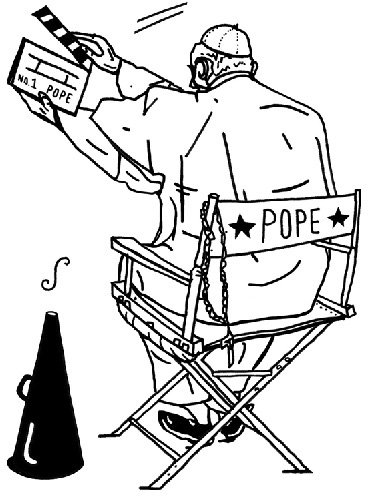
Beyond the Sun is a movie that sees Pope Francis playing the role of Pope Francis. The film tells the story of four children from different cultural backgrounds who are all trying to follow the teachings of Christ. The movie was conceived by the Pope, who pitched it to two film-makers and offered to play a cameo role if they were to make it. It debuted at this year’s Cannes Film Festival.
This is not the first time the Pope has shown an interest in popular culture. In 2015, he released an 11-track prog-rock album entitled Wake Up (Rolling Stone gave the album three out of five stars) and in 2008, before he became Pope, he made references to Lord of the Rings by mentioning Bilbo and Frodo Baggins in his Easter Mass homily.
It wasn’t all show business for the Pope this year, however; some serious decisions also had to be made. For one thing, he took a stand against gluten intolerance, ordering all religious communities to use proper, gluten-filled wafers as part of Holy Communion. In a letter written to all the world’s Roman Catholic bishops, the seriousness of the matter was spelled out: ‘It is for the Bishop as principal dispenser of the mysteries of God, moderator, promoter and guardian of the liturgical life in the Church entrusted to his care … to watch over the quality of the bread.’ A small compromise has been offered, though: it is permissible for communion bread to be very low in gluten.
This year the Pope also gave his first TED talk, opened a free launderette for the homeless and told priests they shouldn’t hesitate to call exorcists* more often when they hear troubling confessions.
POP MUSIC
James: So the summer hit of the year was ‘Despacito’ by Luis Fonsi and Daddy Yankee. It’s become the most streamed song of all time and has been listened to 4.6 billion times. That’s a total of around 30,000 years of playing time, and if you went back that far in history you’d be at a time before rope.
Anna: Fittingly, 30,000 years ago is exactly where my taste in music runs up to.
Dan: ‘Despacito’ has a line, ‘This is how we do it down in Puerto Rico’, and as a result of the song’s popularity Puerto Rico’s governor, Ricardo Rosselló, has named Fonsi the country’s new tourism ambassador.
Andy: I think it’s claimed that the song is bringing in extra tourism money, which will come in handy, because Puerto Rico declared itself bankrupt this year.
James: ‘Despacito’ was not the only big song of the year, but it was pretty much the only one that wasn’t sung by Ed Sheeran. When his album, Divide, came out, it sold 672,000 copies in its first week. That was not only more than the rest of the Top 10 combined, it was more than the rest of the Top 500 combined.
Dan: Another bit of music news that came out is that while touring this year, Adele spent several minutes before every single show being wheeled around in a box.
James: That’s my favourite part of that show, actually.
Anna: What does that mean, Dan?
Dan: Well, in her shows she sings in the middle of the stadium, but she needs to get there without anyone seeing her, she can’t just walk through the crowd. So in some venues she gets inside a box, and they wheel her through the crowd and nobody knows it’s her in there.
James: What does she do while she’s waiting?
Andy: I read she has an iPad with her, so she probably plays Angry Birds or Candy Crush or something.
Anna: She had issues this year with her voice and had to cancel some concerts, and there’s a theory that it’s because she’s singing wrong.
James: Maybe if she got out of the box she wouldn’t have to shout so loud.
Andy: Well, actually, it is down to singing too loud. She has polyps on her voice box, and needs surgery, and according to researchers it’s due to the fact that these days everyone sings too loudly and their vocal cords get bashed together.
Dan: There was one song that reached the charts this year that was 10 minutes of silence. It’s called ‘A a a a a Very Good Song’, by Samir Mezrahi, and the idea is that it will always be at the top of your iTunes alphabetically, and so when you log in, it plays automatically, and you can use the silent time to choose what song you actually want to listen to.
James: That’s very clever. And also good because it probably didn’t damage his vocal cords much when he recorded it.
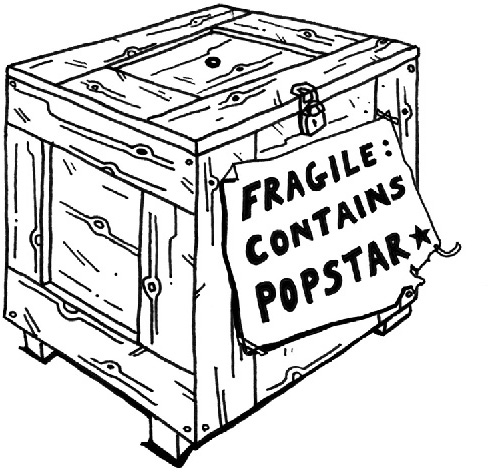
POTATOES▶
Chinese scientists announced plans to send potatoes to the moon to keep their silkworms alive. They also plan to send silkworms to the moon to keep their potatoes alive.
The mission, slated for 2018, will attempt to find out whether life can survive on the moon, and forms part of a wider experiment designed to establish how humans might live there permanently. The silkworms will live in a mini ecosystem, consisting of a small cylinder measuring 18cm x 16cm, and will produce the carbon dioxide necessary to keep the potatoes alive. The potatoes, in turn, will be there to provide the oxygen that will help keep the silkworms alive. The cylinder will also include a webcam, which will live-stream the whole thing.
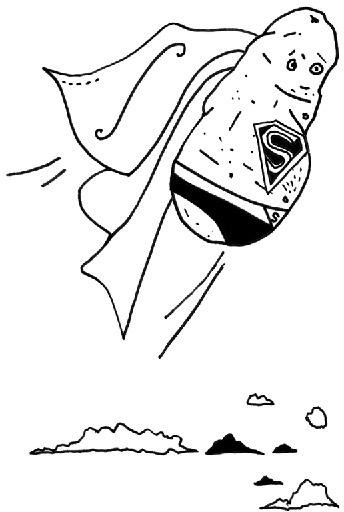
Back on Earth, the International Potato Centre in Peru successfully bred a ‘super potato’. Developed with NASA, it was grown in a miniature satellite box that mimics conditions on Mars, where days are 37 minutes and 22 seconds longer than on Earth, the atmosphere contains very high levels of carbon monoxide, and the surface temperature is freezing. Sixty-five species of potatoes were tried in the experiment, but only one was deemed ‘super’. Coincidentally, that variety is called ‘Unique’.
PROTESTS, DIRTY▶
For North Korean floaters, see Balloons; for Charlotte Church’s message to Donald Trump, see Inauguration; for faeces fighting fascists, see Poo, Dog; for a giant turd protesting raw sewage pollution, see Retirement; for a smear campaign against Gary Lineker, see Toilet Paper, Used; for dung under a door, see Urine; and for poopootov cocktails, see Venezuela.
PROTESTS, NON-DIRTY▶
A US cabinet member praised Donald Trump’s trip to Saudi Arabia, saying it was so successful there wasn’t a single protester. Protests are illegal in Saudi Arabia.
US Secretary of Commerce Wilbur Ross, who joined Trump on the trip, said he thought it was ‘fascinating’ that there was ‘not one guy with a bad placard’. When it was pointed out to him that this was because it was illegal to carry one (protesting in public can lead to a jail sentence of up to 15 years), Ross acknowledged that ‘in theory’ that could be true, but quickly returned to his point, adding, ‘There wasn’t anything. The mood was a genuinely good mood.’
This must have proved a welcome change for the president. Back in Washington DC, 30 per cent of all citizens have taken part in at least one protest against Trump since his inauguration.
Public protest has become a much discussed issue in America. In Minnesota, a meeting about a bill designed to discourage disruptive protesters was brought to an abrupt halt when it was disrupted by protesters. And in North Dakota, politician Keith Kempenich was so worried about protesters getting in people’s way that he proposed a bill that would give immunity to drivers who accidentally ran them over. In his proposal he mentioned that that was something his mother-in-law had once almost done.
It seems nobody is safe in protests these days. In Russia, police accidentally arrested the only pro-Putin demonstrator in a crowd of anti-Putin demonstrators. He was defending the president on camera when, mid-sentence, he was dragged off by a group of police officers.
Perhaps the solution is to protest without actually showing up. One German man managed this when he protested against President Erdoğan of Turkey by setting up a printer by the window in an Istanbul hotel room, and then remotely ordering it to print hundreds of anti-Erdoğan leaflets, which fluttered out to the street below. By the time police had got there to turn the printer off, he had already flown back to Germany.

PUBLIC, DON’T ASK THE▶
The world welcomed Trainy McTrainface and Fluffy McFluffyface, but was cruelly denied Doggy McDogface.
Last year the public was allowed to vote on the naming of Britain’s new polar research ship, and overwhelmingly chose Boaty McBoatface (see Oceans). That time, the will of the people was thwarted – the ship was named RRS Sir David Attenborough and the Boaty McBoatface name was relegated to the on-board submarine. Nevertheless, the trend has swept the world:
After a public poll, Swedish train company MTR Express named one of its new engines Trainy McTrainface, which got almost half of all votes cast. The firm said the name would be ‘received with joy’.*
An extremely rare Humboldt penguin was born in the Hunstanton Sea Life Sanctuary in Norfolk for the first time. As you can’t find out a penguin’s sex until it’s three months old, they had to give it a gender-neutral name and settled on Fluffy McFluffyface.
But not all the bids were successful. An Orlando sheriff’s office called on the public to name their new police dog, and suggestions included Doggy McDogface, Bitey McBiteface, Dr Borkenstein and Tool of the Oppressor. They eventually decided to call the dog Valor.
Elsewhere:
▶ When a San Diego soccer team asked the public what they should call the club, Footy McFooty Face got more votes than all 19 other candidates combined.
▶ The name of Bristol’s newest city-centre bridge was put to a public vote, but Bridgey McBridgeface was deliberately kept off the shortlist. And Isle of Wight Council asked for suggestions for what to call its new floating bridge, with the caveat that Floaty McFloatface would be vetoed. In the first three hours suggestions included The Wight Floater, Sir Floatsalot and Floaty Floaterson.
▶ Eccentric tech squillionaire Elon Musk asked the Internet for a name for his new boring machine, designed to help traffic by digging tunnels under Los Angeles. Among the suggestions his followers on Twitter made were William Burroughs, David Attenburrow, Borey McBoreface … and, perhaps inevitably, Boaty McBoatface.
PUNISHMENTS▶
Criminals were sentenced to learn hairdressing, download Uber and make wholesome rap videos.
In Granada, a teenager who broke into a hairdresser’s and stole a hairdryer was ordered to go on a six-month hairdressing course and then cut the hair of the judge who sentenced him. The judge, Emilio Calatayud, warned the boy that he shouldn’t do a shoddy job or give him a deliberately bad haircut, on pain of a criminal conviction. Calatayud does this a lot: he has previously sentenced an arsonist to work in a fire brigade, and a reckless driver to spend 100 hours with a traffic policeman.

Elsewhere in Spain, a prisoner was ordered to tweet about his crime every day for a month. Convicted of defamation, the head of Spain’s Banking Services Association, Luis Pineda, was given access to social media from prison specifically so he could publicly – and repeatedly – admit his crime.
American judges proved similarly ingenious. Ohio’s Judge Cicconetti started sentencing drunk drivers to download the ride-sharing apps Uber and Lyft, saying of the repeat offenders he kept seeing, ‘They’re not going to stop drinking, period. What you want to do is stop them drinking and driving.’ And a Pennsylvania man found guilty of a gun offence was ordered to make a socially acceptable rap video. The 21-year-old offender had featured in rap videos holding a gun; in response, judge Stephanie Domitrovich said that at some point during his sentence she wanted to see him making a non-violent video with ‘no guns, no drugs’.
PUTIN, VLADIMIR▶
It’s illegal in Russia to depict Vladimir Putin wearing make-up.
In April the Russian government added 183 new items to its list of 4,199 things that it considers ‘extremist’, and therefore illegal to share. Item 4,071 was any picture of a Putin-like person ‘with eyes and lips made up’, implying ‘the supposed non-standard sexual orientation of the president of the Russian Federation’. Memes of Putin in make-up first became popular in 2013, after Russia passed a law that banned teaching children about ‘non-traditional sexual relations’.
Depictions of Putin-like characters were also cut from two Hollywood films this year. In these instances they were censored not by the Russians, but by the studios themselves, which were worried that including such scenes might make them targets for Russian hackers.
Putin did have one brush with Hollywood though, when he met with director Oliver Stone for an interview that aired on the Showtime channel in America. It wasn’t exactly a difficult interview for Putin and we learned very little that we didn’t already know: Putin is extremely paranoid about NATO, he loves judo, and he’s never watched Dr Strangelove. The two men didn’t discuss Stone’s movie JFK, though Putin did mention the subject in an interview with NBC in June. He responded to the accusation that he rigged the US election by saying that if the US intelligence service was able to arrange and cover up the assassination of JFK, it was perfectly capable of fabricating evidence about Russian hacking.